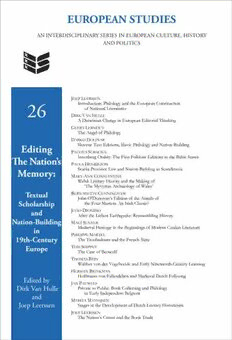
Editing the nation's memory: textual scholarship and nation-building in ninteenth-century Europe PDF
325 Pages·2008·2.902 MB·English
Most books are stored in the elastic cloud where traffic is expensive. For this reason, we have a limit on daily download.
Preview Editing the nation's memory: textual scholarship and nation-building in ninteenth-century Europe
Description:
Europe's nation-states emerged from a complex of nineteenth-century developments in which cultural consciousness-raising played a formative role. The nineteenth-century reflection on Europe's national identities involved a re-inventory and revalorisation of the vernacular cultural past and, above all, the nation's literary heritage. Everywhere in Europe, foundational texts (including medieval epics and romances, ancient laws and chronicles) were retrieved from their obscure repositories. In new, printed editions, prepared according to the emerging academic standards of textual scholarship, they were appropriated, contested and canonised as public symbols of the nation's permanence in history. This often neglected, but crucially important Europe-wide process of 'editing the nation's memory' involved old states and emerging nations, large and small countries, metropolitan and peripheral regions; it straddled politics, the academic professionalization of textual scholarship and of the human sciences, and literary taste. This collection of studies by outstanding specialists offers a comparative synopsis on exemplary cases from all corners of the European continent.
See more
The list of books you might like
Most books are stored in the elastic cloud where traffic is expensive. For this reason, we have a limit on daily download.
